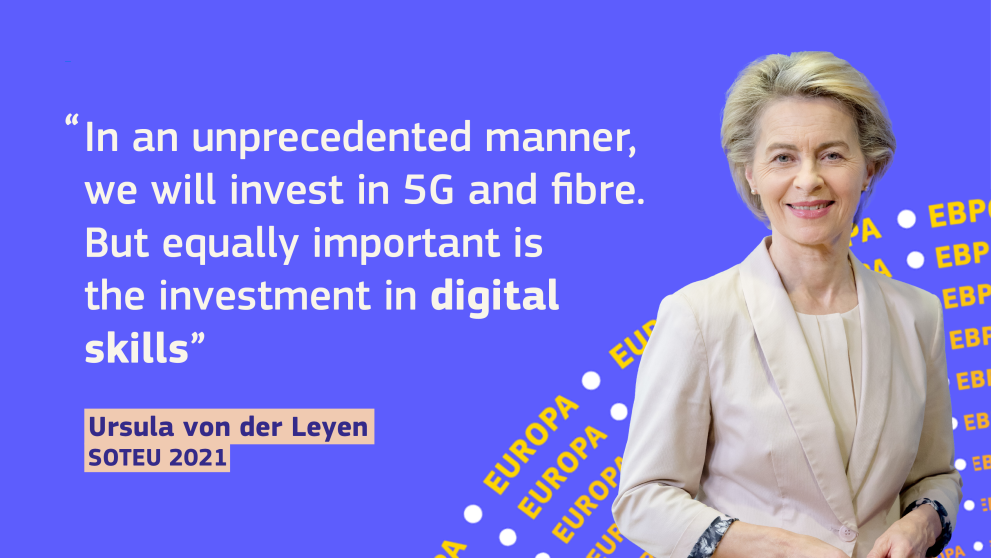
HaDEA manages projects contributing to several key policy initiatives announced in the previous SOTEU addresses. Digital Skills is one of them.
Digital Skills
During the 2021 State of the Union address, the president of the European Commission announced investments in digital skills. The importance of investment in skills “that help companies and strengthen Europe's growth” was also reiterated in the 2022 SOTEU, proposing to make 2023 the “European Year of Skills”.
The European Year of Skills officially began on 9 May 2023 and will run for 12 months, supporting skills-related actions and initiatives across Europe, and bringing together workers and businesses with the common goal of creating fairer and more resilient societies.
EU funding for Digital Skills
This investment need was reflected in the work programme of the Digital Europe Programme. For the period 2021-2027, €580 million was earmarked for the development of advanced digital skills and support the development of a talent pool of digital experts. In the previous programming period (2014-2020), the European Commission invested around 9 million under CEF Telecom programme.
EU funding under CEF and DIGITAL Programmes supports digital skills of EU citizens through four main strains:
1. The Digital Skills and Jobs National Coalitions in EU Member States: The Digital Skills and Jobs National Coalition projects support the participating EU Member States’ national coalitions to share their Digital skills and jobs related activities and content with the Core Service Platform (CSP) at the EU level and with other relevant national coalitions/networks of actors in EU countries. It contributes to the development of digital skills within the internal market.
2. Specialised Education Programmes in Key Capacity Areas (Advanced Digital Skills Masters Programmes): The programme aims to contribute to the target of 20 million ICT experts to be employed in the EU by 2030 as pledged by the EU Digital Decade Policy Programme. The individual funded Master programmes aim at increasing the number of ICT graduates in key digital sectors with better gender balance and with a focus on fulfilling the needs of the industrial ecosystems that rely heavily on cutting edge-technologies. In addition, the funded Master programmes tackle the urgent need for sector specialists (e.g., in health, agriculture, public service etc.) with advanced digital skills.
3. Short term training courses in key capacity areas focus on SMEs digital skills needs/shortages and support the relevant digital training programmes to upgrade and reskill SME workforce.
4. Advanced digital skills analysis aims to assess upcoming digital skills needs and shortages in key digital areas to further benefit the internal market in the long term.
Results of Digital 2021 Skills 01 and Digital 2022 Training 02 calls under DIGITAL
- Grant Agreements: 21
- Geographical coverage: 23 Member States (Spain, Lithuania, Latvia, Estonia, Romania, Italy, France, Germany, Greece, Portugal, Slovenia, Austria, Luxembourg, Finland, Cyprus, Norway, Belgium, Ireland, Netherlands, Denmark, Czechia, Hungary, Poland)
- Total cost: €97 million
- Total EU funding: of €77.7 million
- Co-funding rate: 50-100% simple grants and lump sums, CSAs
- Types of projects:
- Digital Skills and Jobs National Coalitions
- Specialised Education Programmes in Key Capacity Areas (Advanced Digital Skills Masters Programmes)
- Short term training courses in key capacity areas focus on SMEs digital skills needs/shortages and support the relevant digital training programmes to upgrade and reskill SME workforce
- Advanced digital skills analysis
- Beneficiaries: MS national coalitions and networks, universities, research centres, SMEs, industry, training associations, trade unions, business associations.
Funding under CEF Telecom
- Grant Agreements: 26 signed under 2019 and 2020 calls
- Geographical coverage: 25 Member States (Austria, Belgium, Bulgaria, Croatia, Cyprus, Czech Republic, Denmark, Estonia, Germany, Greece, Hungary, Ireland, Italy, Latvia, Lithuania, Luxembourg, Malta, Netherlands, Poland, Portugal, Romania, Slovakia, Slovenia, Spain, Sweden) and one EEA (United Kingdom)
- Total cost: €11 million
- Total EU funding: of €8.87 million
- Co-funding rate: 50-60% simple grants and lump sums
- Types of projects:
- Digital Skills and Jobs National Coalitions
- Digital Skills and Specialised Education Programmes
- Beneficiaries: MS national coalitions and networks, universities, research centers, SMEs, industry
Useful links
European Year of Skills 2023 (europa.eu)
Digital skills | Shaping Europe’s digital future (europa.eu)
Towards the State of the Union 2023 - Achievements (europa.eu)
Details
- Publication date
- 12 September 2023
- Author
- European Health and Digital Executive Agency
- Programme Sector
- Digital
- Programme
- Connecting Europe Facility 2
- Digital Europe Programme
- Tags
- Digital technology
- Digital transformation
- EUFunded
